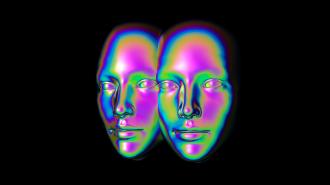Over the last couple years, I’ve been spending time writing about creating ghosts — perhaps an inevitability in the midst of a pandemic.
While created by far-from-supernatural means, these are ghosts nonetheless; they are created from an essence of you — from your voice, your data, your feelings, beliefs, habits, and history. Groups around the world are looking to take such information, this essence, and use it to create a digital version of you that may last once you are gone.
Consider it a technological solution to the problem of death.
Over the last couple years, I’ve been writing about creating ghosts — perhaps an inevitability in the midst of a pandemic.
Artur Sychov, founder and CEO of metaverse company Somnium Space, has joined the quest against loss. Using motion capture and voice data, he wants to create duplicate avatars that can move as you moved and speak as you spoke, using your voice.
“Literally, if I die—and I have this data collected—people can come or my kids, they can come in, and they can have a conversation with my avatar, with my movements, with my voice,” Sychov told Motherboard’s Maxwell Strachan.
“You will meet the person. And you would maybe for the first 10 minutes while talking to that person, you would not know that it’s actually AI. That’s the goal.”
“Live Forever” mode: Somnium Space is an already-working, VR-compatible metaverse. Sychov plans on debuting the “Live Forever” mode later this year, when Somnium will begin the preliminary data gathering of players who opt in to the mode.
If a user decides to use Live Forever, the metaverse will begin collecting the movements and sounds of the players while they are in their own personal plot of land.
VR’s potential for data collection served as a revelation, Sychov told Strachan. VR can record how the entire body moves, which Sychov hopes to utilize to create exact replicas of your avatar. He envisions the avatars speaking in your voice, as well, but did not offer details on how that would work, Strachan reported — mystery and ghosts going hand in hand, of course.
“We can take this data and apply AI to it and recreate you as an avatar on your land parcel or inside your NFT world, and people will be able to come and talk to you,” Sychov told Motherboard.
Groups around the world are looking to create a digital version of you that lasts after you’re gone.
He does not envision your metaversal ghost being stagnant, either; with advances in AI, Sychov predicts the ability to “recreate you better and better” by utilizing the same wealth of data with future algorithms.
Somnium Space hopes to debut the first AI avatars of users next year, ones capable of mirroring your movements and basic conversational abilities — a key challenge for AI still beyond scripted interactions, AI researcher Ahmet Gyger previously told me.
Your AI Afterlife: There’re numerous approaches to the digitally deceased at varying stages of progress, and Gyger is an advisor to one of the most ambitious, Mind Bank Ai.
Mind Bank Ai aims to create what they call personal digital twins. These digital twins would be built from a lifetime of data provided by you via conversations with the platform. The AI would utilize this information to create a digital twin that could be interacted with — ask your dad’s digital twin to tell you about the day you were born, for example.
Eventually, Mind Bank hopes to have digital twins advanced enough that they could utilize “your” speech patterns and beliefs to have conversations about future conditions; imagine asking your deceased father for life advice.
Consider it a technological solution to the problem of death.
Also chasing the future Somnium and Mind Bank are pursuing is HereAfter AI. Founded by James Vlahos, whose experience creating a digital twin of his father inspired the company, it uses interview recording sessions to create the basis for a “Legacy Avatar,” essentially a conversationally-accessible database of your answers to HereAfter AI’s prompts.
I created a Legacy Avatar, in a process that was accessible and odd, if a bit revelatory; the end result — hearing myself answer my own questions — felt like a step towards a future where one isn’t totally gone.
We’d love to hear from you! If you have a comment about this article or if you have a tip for a future Freethink story, please email us at [email protected].






